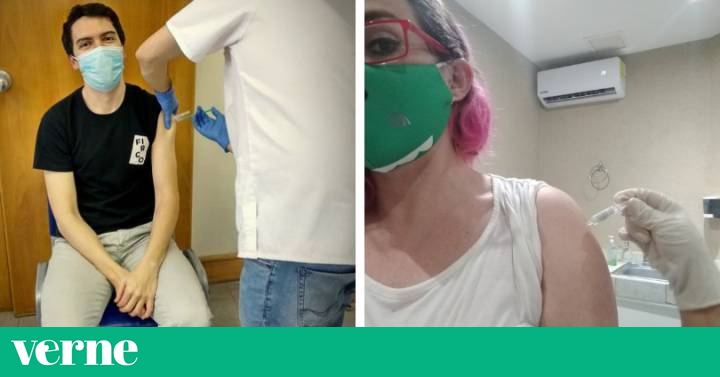Last Saturday, January 16, Rafael Peñalver, a Spanish pediatrician who lives in Soria, published a photograph on his social media account while he was being given the first dose of the covid-19 vaccine.
# YoSíMeVacuno posted next to the image.
9,000 kilometers away, Ana Laura Santos, a Mexican journalist, was participating in the clinical trial of the CanSino vaccine in Acapulco, Guerrero.
He also posted an image of that moment: "You will excuse me, but I am very excited to be participating in this protocol," Santos wrote.
The arrival of the vaccine less than a year after the pandemic began, has become an event that gives a little hope after the physical, emotional and psychological exhaustion.
Recording the moment and posting it on networks has become a new trend that already has a name in the Anglo-Saxon world: '
Vaxxie'
(the mixture between the words
vaccine
and
selfie
).
Spent the day volunteering at a vaccine clinic @AZDHS So energized and grateful to have 1,018 patients be super excited about their vaccines!
Bonus, I got my #COVIDVaccination 😍 #vaxxie pic.twitter.com/AUf8LD8qaO
- Regan City, PA-C, CPHQ (@reganbcity) January 13, 2021
In addition to this new advance in science, a different way of disseminating and telling it in real time is added.
“I have felt privileged receiving the vaccine so soon.
Uploading the photo to my social networks is a way to show that it is safe and we must trust it.
And maybe (I hope) to convince the undecided to wear it, ”explains Rafael Peñalver, 38 years old.
In Spain, as in other countries, health personnel are among the first population groups to be inoculated.
"This is the way I have to contribute my grain of sand so that this ends soon," says Ana Laura Santos, 40.
She, along with hundreds of volunteers in five countries, is part of the groups that tested the Chinese-Canadian injection.
Both people agree that uploading the image to their social networks is an important step to give hope and normalize vaccination.
While the pediatrician finds it important to convince with his image so that more people are vaccinated, the journalist considers that it is a historical moment that must be documented for the future.
“I want to hug my daughter, my parents and friends again.
It is an act of civil responsibility that we should all do, ”argues Santos.
For Rafael Peñalver, the vaccine is a "hope" that will reduce infections and deaths.
“Many more health workers are doing the same, I think it is a form of scientific dissemination.
Seeing images of people getting vaccinated encourages me ”, explains the doctor.
More and more people are sharing their experience with the vaccine.
Like Dr. Ryan Shelton, in the United States, who shared a video with the first impressions after receiving the Moderna vaccine.
"I have a little itch at the injection site which was to be expected, so I took ibuprofen to reduce it. So far, everything is fine," he shared on Twitter.
24 hours after 1st @moderna_tx covid vaccine 💉 and feeling ... # CovidVaccine #vaxxie #notthrowingawaymyshot @TryonMedical pic.twitter.com/67vATRHoxa
- Dr. Ryan Shelton (@ryansheltonMD) January 9, 2021
It is precisely that excitement and thirst for good news that makes vaccine selfies arrive at the right time and are so well received.
“Photography is a node of hope to cope with the months that we have left.
The virtual is also real ”, says the academic, researcher and specialist in digital culture, Irene Soria.
The expert points out that it is important not to lose sight of the use that social networks can give of the information we share, also in the context of the pandemic.
Now more than ever, screens have become the only window through which we look out at the world and that is representing an unparalleled benefit for the owners of the platforms.
“When we upload a photograph to a platform we are assigning rights or we allow them to use our information as they see fit.
That's why you have to be cautious with what you share, ”adds Soria.
Rafael Peñalver and Ana Laura Santos consider that their
vaxxies
serve to eradicate “fear and mistrust”.
"I have always been very combative with the anti-vaccine or denialist groups because they prefer to believe imagined certainties (no matter how crazy they are) to the evidence and uncertainties that science handles," says the doctor.
More and more health workers and people from civil society share their photographs.
They have been the first to receive the vaccine and the first to tell about it in the internet age.
The image will remain for history.
Follow Verne México on Facebook, Twitter and Instagram and don't miss your daily ration of internet wonders.

